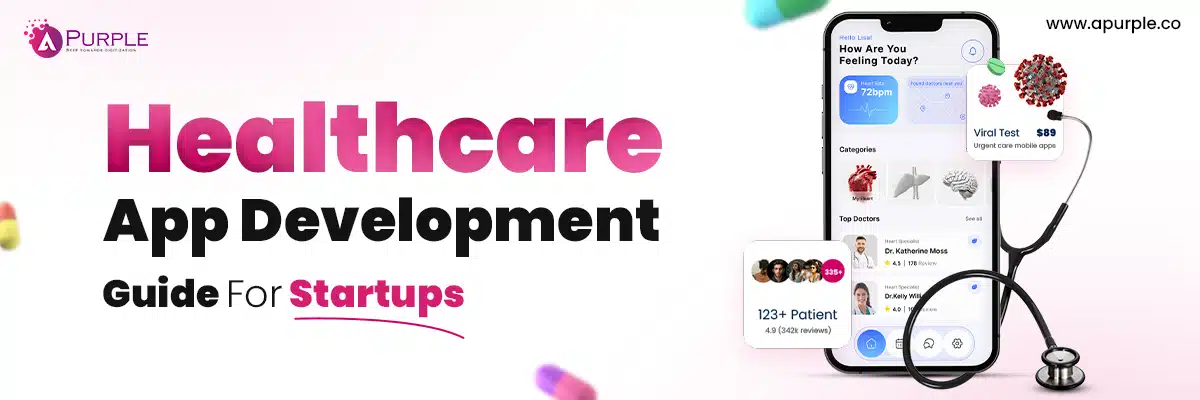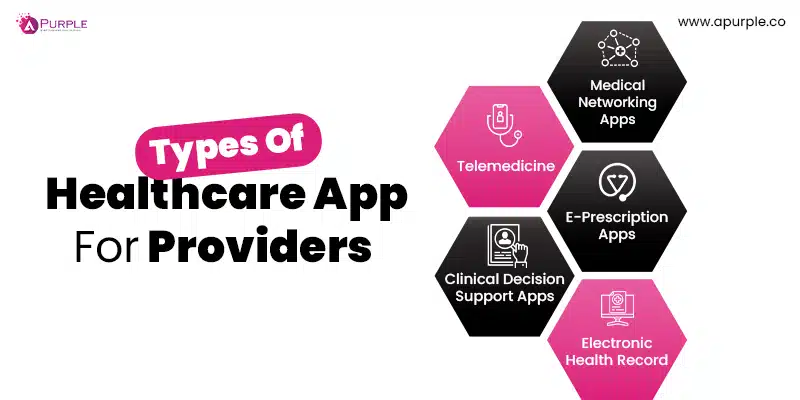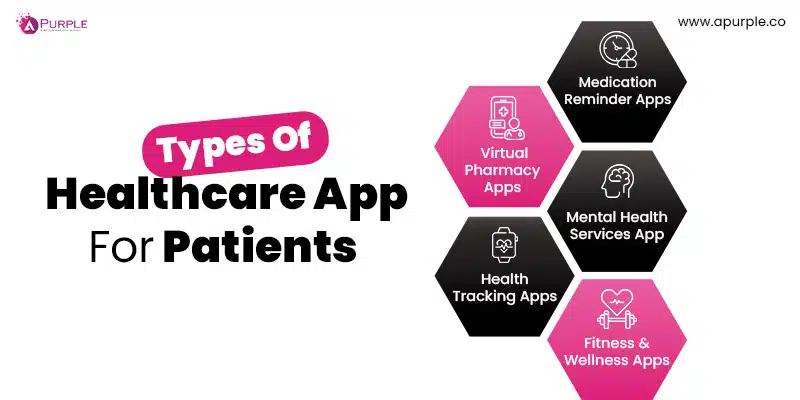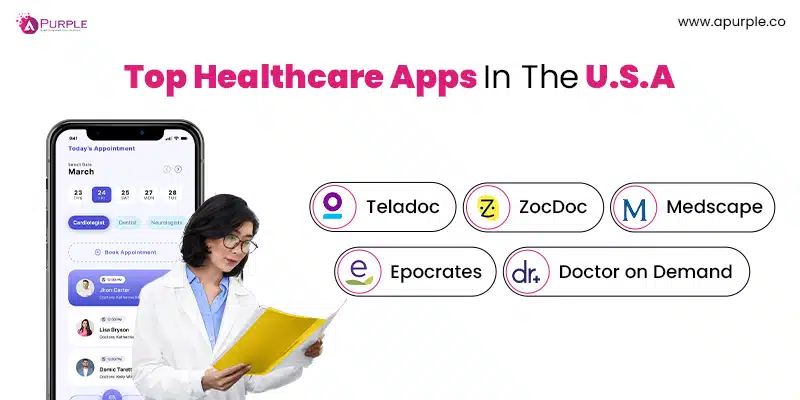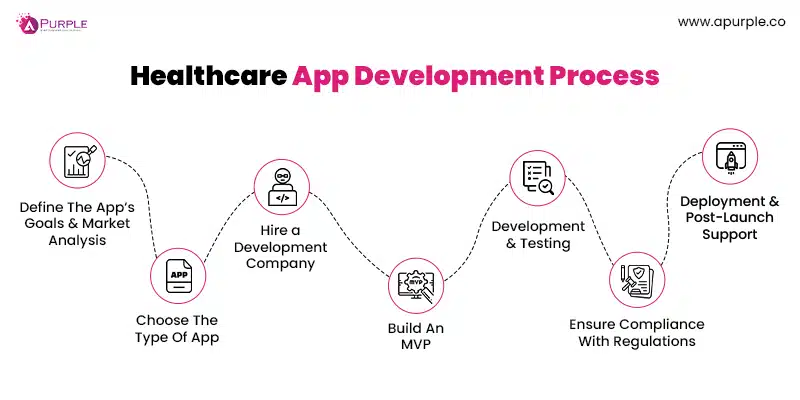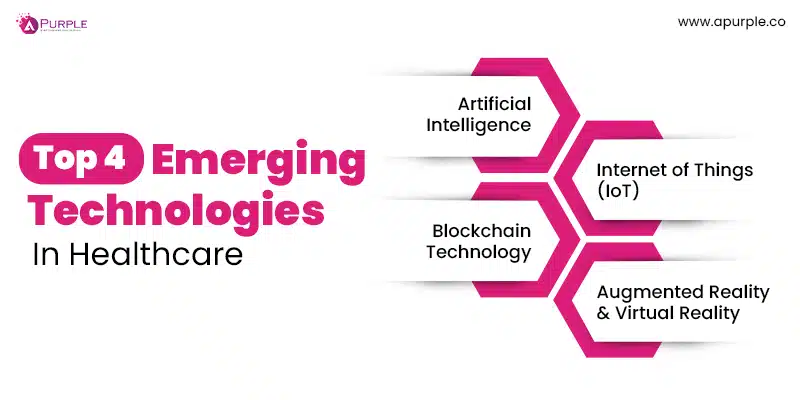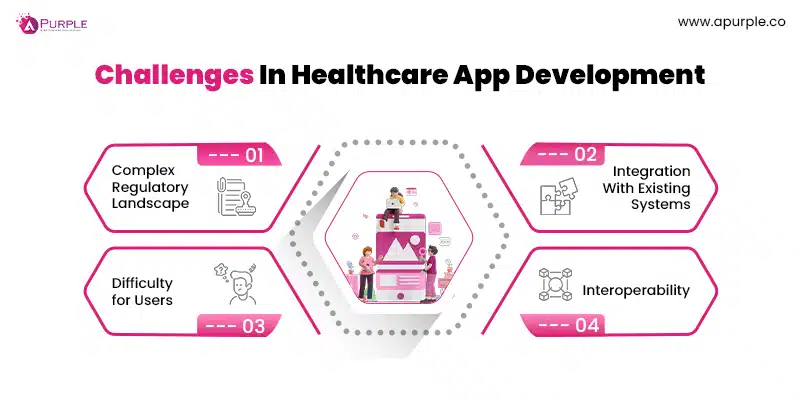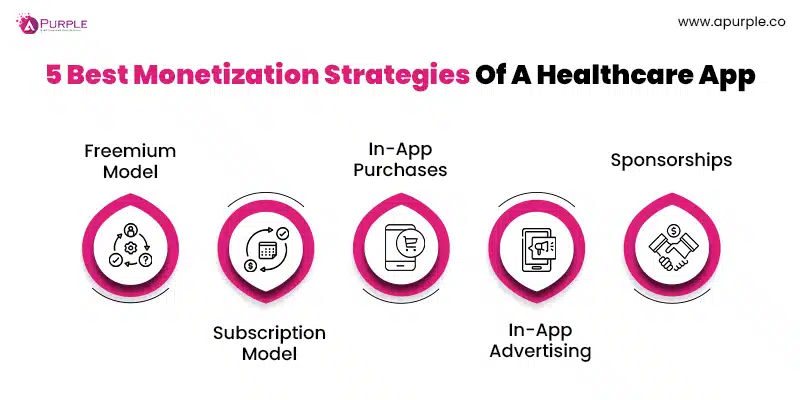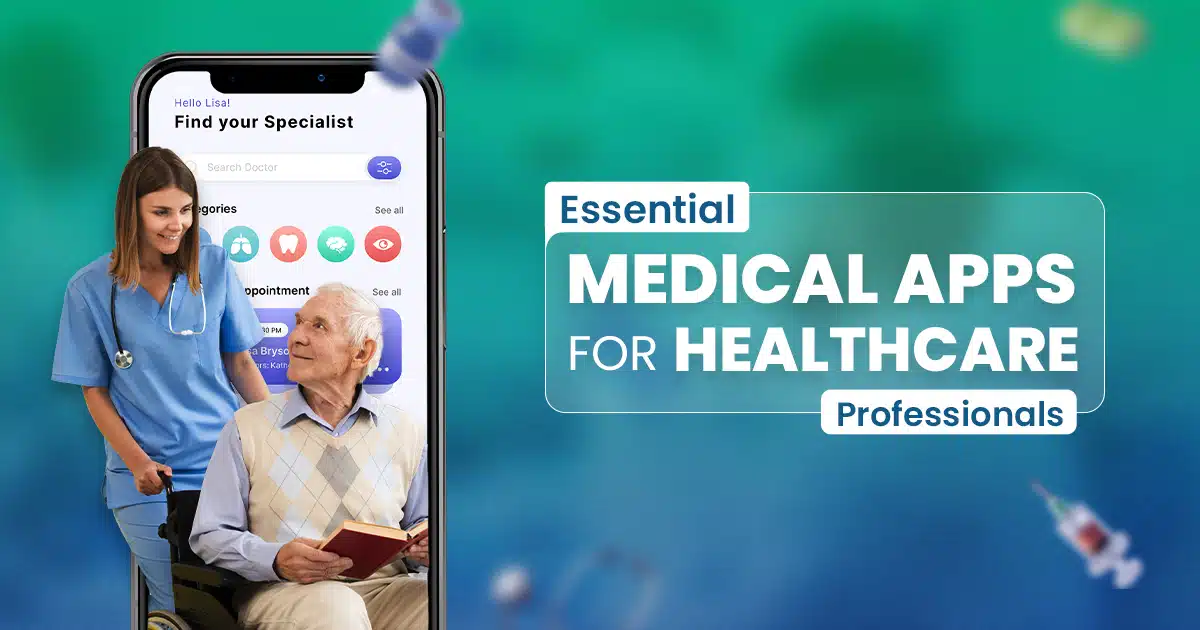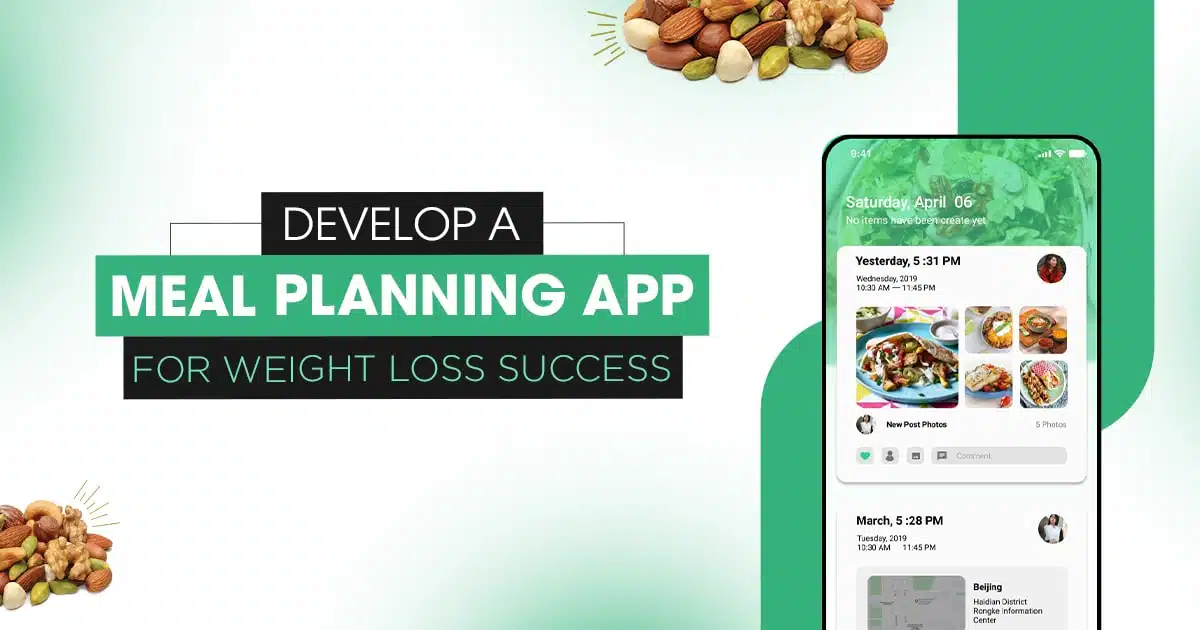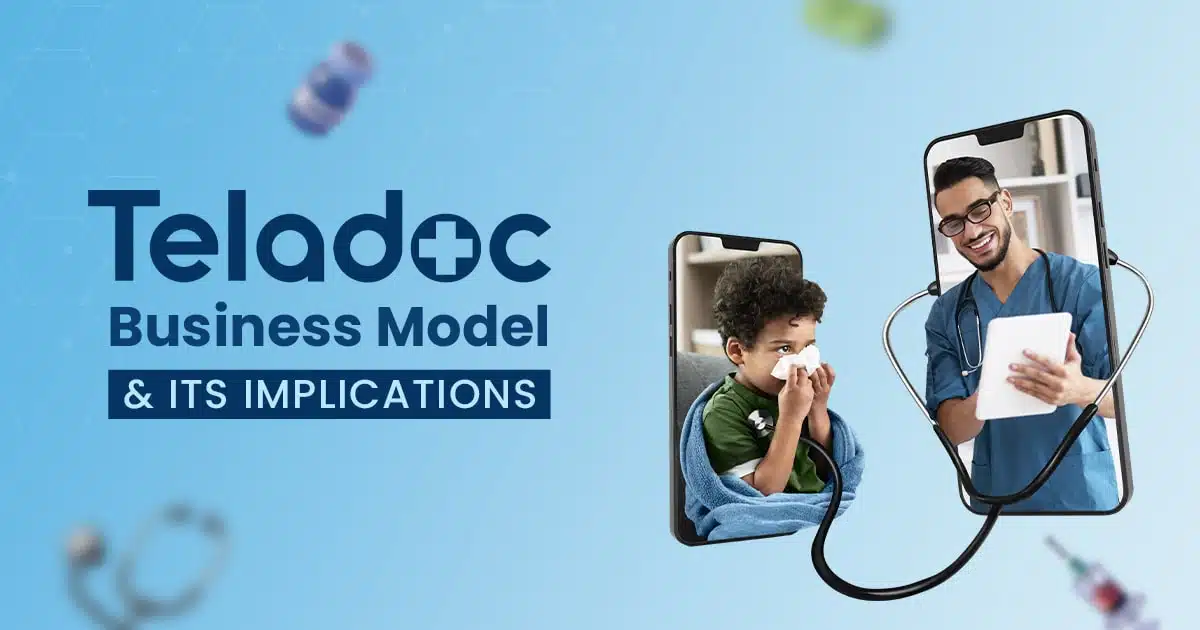Healthcare service providers and startups face challenges such as fragmented medical data, limited rural healthcare access, and language barriers. These become roadblocks for patients who need healthcare facilities and services.
Startups can use healthcare app development to solve these problems and overcome challenges. This technology provides better health tracking for patients and doctors, broader access to healthcare, and faster delivery of medical services.
However, developing a mobile app for your healthcare services needs careful planning, a robust development strategy, and a reliable tech stack. This article will cover everything you need to know about healthcare application development. Let’s begin by understanding the basics of developing healthcare apps.
What Is Healthcare App Development?
Healthcare app development is creating a web or mobile application to bridge healthcare service providers and patients. It caters to the different needs of patients, healthcare service providers, and hospital administrative staff.
Healthcare mobile app solutions can include telemedicine applications for remote consultations, mHealth apps for managing chronic diseases, fitness tracking, and health monitoring. Developing a healthcare app can help patients receive personalized health services and assist doctors in making faster and more informed diagnostic decisions.
While doctors and healthcare service providers have been using conventional approaches to offer patient consultations, times have changed. With the advent of telemedicine applications, consultations happen virtually. This has led to a compelling need for many medical practitioners and clinicians to invest in healthcare app development.
Why Should You Invest In Healthcare Application Development?
Understanding the market is key to ensuring your investments provide the desired results. Market analysis allows you to gauge the level of competition and plan your project accordingly.
Here is the healthcare app market in numbers,
- Digital health startups raised $5.7 billion through 266 deals in the first half of 2024.
- K Health, a digital primary care business, raised $50 million in equity fundraising that same year to expand its AI-powered medical services and support its expansion.
- Furthermore, the global market for mHealth apps is expected to be worth $86.37 billion by 2030.
- Approx 75% of North Americans prefer using online healthcare services.
Understanding the market is okay, but you also need a thorough understanding of the several kinds of healthcare apps available in the market, and what they offer to both patients and providers competition analytics, including its offerings and features.
What Are The Types Of Healthcare Apps?
There are many healthcare applications, each solving specific patient issues. Let’s discuss some of the types of healthcare apps.
Type 1 – Healthcare Apps for Providers
1. Telemedicine
Telemedicine apps facilitate patient-physician interaction virtually. They eliminate geographical limitations, allowing patients to receive treatments through video, chat, or audio calls from the comfort of their homes.
Pro Tip: If you want to develop a telemedicine app, watch a quick live demo of our clone solution. It reduces the time and cost needed to develop such applications.
2. Electronic Health Record (EHR)
EHR is an application that collects and handles all the administrative and clinical data associated with treating an individual under a specific provider. It includes data on demographics, medical history, vaccines, labs, imaging, problems, medications, vitals, and progress notes.
3. Medical Networking Apps
It is a communication platform that connects healthcare professionals to communicate with each other and share insights, research, and best practices. They create a collaborative environment for medical learning and decision-making.
4. Clinical Decision Support (CDS) Apps
It offers real-time guidance by analyzing patient data and suggesting evidence-based treatment plans. These apps assist professionals in making accurate and informed clinical decisions.
5. e-Prescription Apps
These apps simplify the prescription process, allowing professionals to send digital prescriptions directly to pharmacies. They enhance accuracy and prevent medication errors.
Type 2 – Healthcare Apps For Patients
1. Mental Health Services App
Mental health apps support an individual to seek help for therapy, counseling, and managing mental health disorders without feeling judged. These apps provide features such as personalized coaching, meditation, mood logs, thought challenges, reducing stress, and more.
Check out our detailed guide on mental health business ideas to see how startups can innovate in this space.
2. Medication Reminder Apps
Patients use medication reminder apps to ensure they never forget to take their medicines. These apps offer notifications about medication dose timings and the right time to get a refill.
3. Health Tracking Apps
Fitness tracker apps allow patients to monitor their health by monitoring data on activity, heart rate, sleep, diet, and other contributors, assisting them in defining a fitness plan. Users can identify trends, spot potential health risks, and adopt healthier lifestyles with greater ease and motivation.
4. Fitness and Wellness Apps
These apps help patients to track workouts, monitor calorie intake, and set fitness goals. They often integrate with wearables to provide real-time health insights and encourage a healthier lifestyle.
5. Virtual Pharmacy Apps
Patients can order prescriptions, refill medications, and receive doorstep delivery through these apps. They also provide medication information, pricing, and discounts.
Each type of app has something unique to offer for your healthcare services. However, which one to choose depends on what benefits it can offer. Because healthcare app benefits can differ based on the stakeholders.
Who Can Benefit From Healthcare Apps?
1. Patients
Patients are perhaps the most direct beneficiaries of healthcare apps. These apps bridge the gap between individuals and the healthcare system, offering features that enhance convenience and quality of care.
Key Benefits for Patients
| Easy accessibility to Healthcare | Patients can avail of medical services through video, chat, or a simple voice call, saving time for unnecessary physical meetings. |
| Improved Health Management | Patients can track medical conditions, medications, and health metrics for better disease control and outcomes. |
| Personalized Care | Patients receive customized recommendations using stored health data and symptom tracking. |
| Mental Health Support | Patients can access therapy, stress relief exercises, and mindfulness tools through apps like BetterHelp and Calm. |
| Cost-Effectiveness | Patients will have reduced medical expenses with fewer hospital visits and affordable subscription models. |
2. Healthcare Providers
Healthcare providers, such as doctors, nurses, and therapists, also stand to gain significantly from the widespread adoption of healthcare apps. These apps help providers manage their time, patient data, and workflows more efficiently, ultimately improving care delivery.
Key Benefits for Healthcare Providers
| Enhanced Efficiency | Simplified administrative tasks with apps like EHR systems by reducing paperwork and errors. |
| Remote Monitoring and Virtual Care | Monitor patients and provide follow-up care virtually via telemedicine platforms. |
| Improved Collaboration | Share patient data and treatment plans among medical teams in real time for seamless care coordination. |
| Better Patient Outcomes | Use real-time health-tracking apps to address potential health issues proactively. |
| Time Management | Automate scheduling and reminders, enabling providers to focus more on patient care. |
3. Healthcare Organizations
Healthcare institutions like hospitals, clinics, and health insurance companies, also stand to gain a lot from healthcare apps. Such organizations intend to deliver quality care promptly too, while managing expenses, and apps are the core of it.
Key Benefits for Healthcare Organizations
| Improved Operational Efficiency | Streamlines processes like billing, scheduling, and patient communications with apps like Zocdoc. |
| Data-Driven Decision-Making: | Organizations can use app-generated data for performance analysis, workflow optimization, and better resource allocation. |
| Cost Reduction | Minimizes operational costs by reducing unnecessary hospital visits and readmissions through chronic care monitoring. |
| Regulatory Compliance | Ensures adherence to data privacy standards with apps designed to meet HIPAA and other regulations. |
| Patient Retention and Satisfaction | Enhances patient experience with features like appointment reminders and easy health record access. |
You have analyzed the market by now and understood the benefits offered by these apps to their different user bases. But, to stay competitive, you need to know about your top competitors and what they offer to their customers.
Top 5 Healthcare Apps In the U.S
- Teladoc is a leading telehealth app that provides 24/7 access to board-certified doctors through video calls, phone consultations, and messaging.
Pro tip: You can also build a Teladoc clone if you want to enter the market quickly with a readymade solution.
- Doctor on Demand offers video consultations with physicians available 24/7. Patients can book appointments, receive prescriptions, and manage their healthcare needs efficiently.
- ZocDoc is an easy-to-use application designed to help patients quickly search and make appointments with doctors.
- Medscape is a medical site that contains news, drugs, diseases, CME information, and nurse resources designed specifically for healthcare professionals.
- Epocrates is a mobile application that provides doctors and pharmacists with drug information, guidelines, and diagnostic tools.
By now, you know what your competitors offer and what kind of app you need to build so that your target users can get the best out of it. This means your next step is to plan your healthcare app development process.
How To Develop A Healthcare App? A Step-By-Step Process
The development process may seem complex if you come from a non-tech background and want to develop a healthcare app. However, understanding the basics of app development for healthcare can make the journey much more manageable.
Here is a breakdown of the entire process to simplify the development.
Step 1: Define The App’s Goals And Perform A Market Analysis
Clarify your app’s purpose. Answer the following questions to understand the sole purpose of your healthcare app,
- What do you want your app to achieve?
- What problem will it solve?
- Who is this app for? Patients, doctors, or organizations?
Once you have the answers, perform a market analysis. Research your existing competitors and user pain points to understand what gaps exist in the market. Conduct customer interviews and peer reviews of competitor offerings and features. This will help you determine which features are missing that can fill the market gap.
Pro tip: Look into app reviews to find existing issues. They’re a goldmine for crafting standout features!
Step 2: Choose The Type Of App
In this step, you must finalize the app type you will develop. You can choose to develop a fitness app, telemedicine app, EHR app, or something else.
Analyze how the app solution you want to develop aligns with project goals. Also, gauge whether the app solves customer problems and caters to their unique pain points. For example, if you are trying to solve the issues of remote healthcare access, telemedicine applications are the best to develop.
Deciding the type of app you want to develop will help determine design, functionality choices, and technical requirements.
Step 3: Hire A Healthcare App Development Company
Healthcare application development requires expertise.
You’ll need expertise in UI/UX design, coding, and compliance. This is why you need a healthcare mobile app development company that offers custom solutions and expertise in creating domain-specific applications.
First, consider the list of companies, analyze their portfolios, compare their approaches to similar projects, and finalize the one that matches your vision. These companies generally offer multiple engagement models that define how you collaborate with them throughout the project lifecycle. These models determine the structure of the partnership, including pricing, resource allocation, and project management.
Step 4: Build An MVP App
Start by building an MVP mobile app instead of a full-fledged app right away. This version includes only the core features needed to meet user needs. It allows you to test your app in real-world scenarios without investing too much time or money upfront.
Gather feedback from early users and refine the app based on their input. For instance, a medication reminder app’s MVP might only include setting reminders and tracking doses, leaving advanced features like pharmacy integration for later.
Step 5: Development And Testing
This stage transforms your healthcare business idea into a functional, user-ready app.
Let’s break it down for your better understanding.
1. Frontend Development
Focus on creating an intuitive user interface (UI) that is easy to navigate. Choose frontend frameworks (e.g., React Native, Flutter) for cross-platform compatibility. Integrating features like larger fonts, voice commands, and high-contrast modes ensures accessibility.
2. Backend Development
The backend manages secure data management and API integrations with third-party services such as wearables or EHR systems.
3. Security Protocols
Healthcare apps handle sensitive data, so compliance with security and privacy regulations becomes essential. Strict security measures should be added to protect sensitive data, including data encryption, 2-FA, RBAC, and compliance checks.
4. Testing Phase
Thorough testing is critical for healthcare apps. Conduct functional, performance, usability, security, and compatibility testing to ensure the app works as expected across different conditions.
Step 6: Ensure Compliance With Regulations
Patient data and safety are things that you can’t compromise at any cost, so you’ll need to comply with regulations. Work closely with healthcare mobile app developers who are experts in regulation adherence to ensure your app meets all necessary standards.
Some of the data regulation standards that you need to ensure compliance are:
- HIPAA
- HITECH
- GDPR
- HL7
- FHIR
Step 7: Deployment And Post-Launch Support
Once your app is tested for performance and compliance, launch it across the platforms. The process is not complete once the launch takes place, the post-launch phase is equally crucial as the pre-launch phase. Keep a log of customer feedback to know about any issue, and continuously improve the application as per the requirements of the users.
Besides that, keep adding new features to counter the competitors. What features you add will have a significant impact on your business outcomes, So, it becomes vital to determine features that will help your healthcare app deliver an unparalleled customer experience.
Must-Have Features For Healthcare Application Development
Here are some features that your healthcare app must have.
Features For Patients
| User Registration & Profile Management | Create and manage personal and medical profiles, serving as a digital health ID. |
| Appointment Scheduling | Book, reschedule, or cancel appointments effortlessly. |
| Telemedicine Integration | Book virtual consultations through secure video and chat features. |
| Medication Reminders | Get automated alerts to remind patients to take medications on time. |
| Health Tracking | Monitor key health metrics like heart rate, blood sugar, and sleep patterns, often via wearables. |
Features For Healthcare Providers
| Doctor Profiles | Showcase expertise, experience, and availability for transparent patient bookings. |
| EHR Access | Securely access patient health records, including prescriptions and test results. |
| Appointment Management | Manage schedules and confirm or adjust appointments to avoid overlaps. |
| e-Prescriptions | Send prescriptions digitally to pharmacies for efficiency and accuracy. |
| Telehealth Dashboard | Handle virtual consultations through a single interface for video, audio, or text communication. |
Features For Healthcare Organizations
| Payment Integration | Offer easy payment options within the app for services rendered, streamlining billing processes. |
| Analytics Dashboard | Generate insights into patient behavior, no-show rates, and treatment trends. |
| Inventory Management | Track medical supplies to avoid overstocking or shortages. |
| Multi-User Access | Provide job role-based permissions to ensure that staff access only relevant data. |
| Real-Time Updates | Get real-time information about important changes or alerts regarding services. |
Apart from these features, there are advanced ones that you can develop by integrating innovations like AI, IoT, and Blockchain technologies. Let’s understand some of the key technologies that power advanced features.
Emerging Technologies In Healthcare
Here are some of the emerging healthcare technologies that are expected to play a major part in bringing in a new era of healthcare.
1. Artificial Intelligence (AI)
According to a survey, 77% of health executives revealed that they view investments in AI as one of their core areas of focus for the coming years.
That’s one of the reasons AI has topped this list. AI has helped healthcare apps reduce administrative workload by scheduling appointments, documentation, and addressing the queries of patients through chatbots. Plus, huge datasets are used to train the AI algorithms and hence, AI can predict the results and the type of medication or the kind of treatment required by a person. So, for instance, if you are willing to develop a Medicine delivery app, this one is the best feature to have.
2. Internet Of Things (IoT)
IoT-integrated apps connect with wearable devices like smartwatches to monitor vital activities and sync data in real-time. This helps doctors track patient progress and provide timely treatments. For example, a smartwatch detecting irregular heartbeats can alert both patients and doctors, allowing for immediate action. Such innovations are redefining real-time health management.
3. Blockchain Technology
Security is a matter of utmost importance in healthcare and blockchain technology offers a strong solution for protecting sensitive patient data.
Blockchain secures patient data through a decentralized ledger. Data is stored in sequential blocks and linked together in a chain, making unauthorized modifications impossible.
4. Augmented Reality (AR) And Virtual Reality (VR)
AR and VR have completely transformed patient education and medical training.
AR overlays important information during surgeries, aiding precision, while VR offers risk-free simulations for medical training. Through interactive experiences, these technologies can also assist patients in understanding complex medical issues or visualizing their treatment plans.
After you analyze the trends in healthcare app development and decide what features and technologies to integrate, it’s time to estimate the cost. It’s not just about the development, integrating advanced technologies can also contribute to the healthcare app development cost.
How Much Does It Cost To Develop A Healthcare App?
The cost of developing a healthcare app starts at $18,000 for an MVP and can exceed $300,000 for an advanced app with AI features.
Here is a breakdown for your better understanding.
| App Type | Development Time | Estimated Cost |
|---|---|---|
| MVP Healthcare App | 1–1.5 months | $18,000–$30,000 |
| Medium Complexity App | 5–9 months | $30,000–$100,000 |
| Advanced Healthcare App (with AI/ML features) | 9+ months | $100,000–$300,000 or more |
The time frame is subjective and is influenced by several factors, which are as follows:
- Project Complexity: Advanced and complex applications take longer to develop. For example, creating an MVP mobile app might take about 3-5 months, while a complex EHR system could take up to 12 months.
- Feature Set: The more features you include (like telehealth capabilities or advanced analytics), the longer it will take to build the app. Each feature will require more time for activities like design, development, testing, and integration.
- Team Experience: An experienced development team will leverage best practices and reduce the time needed to build the app.
Your healthcare mobile app development project planning becomes much easier if you are aware of these expenses and schedules. By taking into account all the factors that affect the cost, you can develop an app within your pre-defined budget. While budgeting can be a challenge for your healthcare app projects, there are many others that you may face.
4 Big Challenges In Healthcare App Development And How To Overcome Them
Healthcare application development isn’t that easy. Let’s be straight!
Some serious challenges may come up during this process and you need to understand them before your app fails. Here are some of those challenges along with their solutions.
1. Complex Regulatory Landscape
One of the biggest challenges for a person who is new to this industry is knowing the regulations, especially looking at how these laws vary across countries. Common regulatory standards like HIPAA in the U.S. or GDPR in the EU impose strict guidelines on patient data protection and app compliance. On top of that, the emergence of newer laws adds more to the complexity. These regulations ensure safety but if your app fails to comply with any of them, then it can lead to hefty fines and legal issues.
Solution
Begin by understanding the specific requirements of your target market and creating a compliance roadmap. Partner with experts who specialize in healthcare compliance, they can help you stay aligned with regional and global regulations. Conducting thorough risk analysis and staying updated on regulatory changes will also keep your app compliant and secure
2. Integration With Existing Systems
Some healthcare organizations use a mix of legacy systems and new technologies. The major problem with these legacy systems is that they are not designed to communicate with modern apps. This leads to inefficiencies and can become a hurdle in patient care, as important information cannot be accessed instantly when required.
Solution
You can use APIs to enable data exchange between old and new systems. Also, invest in cloud-based platforms that allow seamless integration while maintaining the consistency of the data across systems. It is recommended to hire dedicated healthcare app developers who specialize in API integration, as they can also help reduce integration headaches.
3. Difficulty For Users
As you all know, healthcare apps cater to both patients and healthcare providers. They often struggle with overly complicated interfaces, which can lead to lower adoption rates. Even if they start using it, ultimately it may lead to frustration and low engagement rates, which then affects the app’s success.
Solution
Focus on the healthcare app’s UI/UX design that prioritizes user-centric principles. Conduct usability tests with real users across diverse demographics and gather their feedback on the interface and functionality. Simplifying the in-app navigation and providing clear tutorial guides can significantly enhance the user experience, making it more usable for everyone.
4. Interoperability
Interoperability is essential for smooth communication between healthcare apps and systems. But, proprietary systems and differences in data standards can result in information silos that hinder the care of patients and limit access to patient data and smooth data exchange.
Solution
Interoperability standards such as DICOM or FHIR can be adopted to improve communication across healthcare systems. The HL7 and FHIR protocols can also ensure language exchange, while cloud-based solutions centralize data while maintaining accessibility.
Apart from the above challenges, there is one challenge that every healthcare startup faces- “Revenue Generation.” It becomes crucial to generate enough revenue to sustain in a competitive market. So, here are some of the revenue models that can help any healthcare startup thrive.
5 Best Monetization Models Of A Healthcare Application
To earn returns from your investments, it is important to implement the right monetization model. Here are a few of the popular ones that you can choose from.
1. Freemium Model
Freemium is the most commonly used strategy that is used in majority of the healthcare applications. Under this model, users can access all the basic features like profile management, appointment scheduling, general healthcare articles, or medication reminders for free.
To get access to advanced features like integration with wearables, multi-user access, and unlimited telemedicine consultation, they will be charged a certain amount.
2. Subscription Model
In a subscription model, users need to buy a subscription plan that can be weekly, monthly, or yearly. What differentiates it from freemium is that, here apps provide a 7-day free trial to allow users to utilize extra perks and persuade them to get a subscription to keep using those services.
Under this model, apps generally provide a discounted processing fee, priority processing, unlimited e-consultation, personalized diet recommendations, and more.
3. In-App Purchases
By providing an in-app purchasing option, users can buy various extra services, medical products, features, or even content within the app. This adds to the user experience. On a global level, users spend around $380 billion on in-app purchases.
4. In-App Advertising
Here, you simply play advertisements of different brands, marketing their products and services, and against that, you charge them on pay-per-view or pay-per-click. The ads can be video ads, polls, banner advertisements, and more.
5. Sponsorships
Sponsorship involves partnering with a third-party entity, such as a healthcare business or hospital, to provide financial support for app development, content creation, or research studies.
In return, the app promotes the sponsor’s brand, products, and services.
This innovative business model is prevalent in the healthcare industry, with 24 out of 100 medical app publishers using this method. Such revenue models need the integration of third-party apps and services. To ensure robust integrations you need customized APIs.
Without an expert healthcare app development service, customizing the APIs and integrating third-party apps becomes complex. This is where an expert healthcare app development company like aPurple can help.
Why Choose aPurple For HealthCare App Development?
Healthcare apps are an opportunity for startups to solve the gaps in the healthcare system and create solutions that genuinely make a difference in people’s lives. We hope that this article becomes helpful in your healthcare application development project.
Building such apps requires technical expertise and a deep understanding of the healthcare industry’s unique needs and challenges. aPurple can assist you with this. We specialize in delivering end-to-end healthcare mobile app development services, including mobile app consultation, design, development, API Integration, Testing, and post-launch support.
With over a decade of experience in the healthcare industry, our experts understand startups’ unique challenges.
We build innovative and user-friendly solutions that ensure adherence to global regulations. Whether you need to develop a healthcare app from scratch or improve an existing one, we’re here to guide you every step of the way.
Connect with us today to collaborate with a trusted healthcare app development company that prioritizes innovation and excellence.
Frequently Asked Questions

